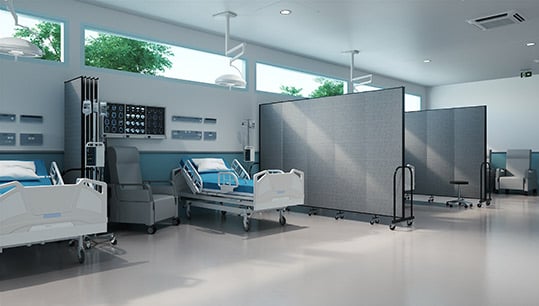Optimal Healing Environments: 4 Tips for Hospital Recovery
Market: Healthcare
How does mental health affect physical health?
The state of your mind affects your body. When mental illness such as depression or anxiety takes over, it weakens your immune system. Therefore it not only makes it easier to get sick but also harder to recover as well. For this reason, depression is commonly linked to heart disease. A depressed person will likely have a poor diet and exercise minimally, which are actions that lead to a higher risk of heart disease or other circulatory issues. Hospitalizations, in particular, have many cases of depression within them. When these people are already struggling with their physical health, they need an optimal healing environment to recover completely. Here are some healing tips hospital staff can do for both the mental and physical health of their hospitalized patients.

- Photo by tirachardz – www.freepik.com
1. Privacy and Dignity Protection
Since a lack of privacy can lead to anxiety and depression, those admitted to the hospital need a lot of seclusion. Most healthcare facilities will have some sort of curtain to draw in between patient beds; however, the adaptability is limited. To have more control over the privacy barrier, some hospitals use portable room dividers instead. These sturdy barriers help protect a patient’s dignity by remaining hidden from potential onlookers. Not only do mobile screens move and fold up as necessary, but they also absorb sounds as well. By minimizing noise, patients can have auditory privacy at the same time as visual privacy.

2. Nature
Utilizing elements of nature is excellent for one’s health. Fresh air alone allows germs and bacteria particles to dissipate into the atmosphere. Plants and trees are also beneficial because of the high levels of oxygen they emit. The more oxygen vs. CO2 in your body, the more capable you are to heal. In a hospital room where windows don’t open, bring in plants for the extra oxygen. Another important element of nature is the sun. Natural sunlight gives us vitamin D, which has several benefits; fighting disease and depression are among a couple of them. If the hospital patient is unable to go outside, there are plenty of sunlight-mimicking lights. These lights would work great in any room of a hospital since anyone there could use extra vitamin D.

- Original photo by whatwolf – www.freepik.com
3. Soothing Sounds
Hospitals sometimes get loud and chaotic with so many people coming in and out. The excess noise can cause duress on a recovering patient. To minimize the sounds from the hallways coming in the rooms, use acoustical wall paneling. These panels can help reduce echoes to create a more desired sound. Meditative audios can also help soothe the mind. Similar to the last point, nature sounds can help still the mind and let go of anxieties. By allowing a calming auditory atmosphere for your patients, they can potentially take their mind off of the physical pain of their bodies.
4. Declutter
Another healing space technique is to clear the room from excess clutter. The only things in the room should be things that are either necessary for the patient’s health or bring them joy. A cluttered space makes a cluttered mind, and vice versa. If there are unnecessary or messy belongings, it can cause extra stress on a person’s psyche. To lessen their stress, recommend to patients and their families to bring only essential items.
Especially in a hospital setting, mental health and physical health are closely connected. While the hospital staff can’t necessarily force their patients’ minds to be healthy, they can adjust their rooms and facilities to create the most optimal healing environment.